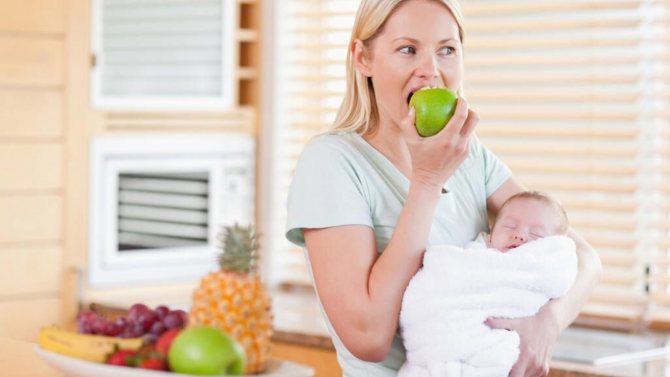Why does a baby fart but not poop and what to do?
As practice shows, problems with stool in newborns occur with enviable regularity.
At the same time, disturbances in the functioning of the intestines also occur in those children who are fed breast milk, and are equally characteristic of bottle-fed infants. In the first 12 months, constipation occurs in at least a quarter of babies. In this case, in an infant, defecation most often occurs with great difficulty and is a rather painful process. The feces in this situation are somewhat reminiscent of goat excrement. It is just as hard and dry. At the very beginning of life, the reactions of the human body are not yet fully formed. As a result, bowel or bladder emptying occurs involuntarily and only in cases where the pressure on the sphincters begins to exceed the maximum permissible values.
What to do if your newborn doesn't poop?
If your newborn doesn't poop every day, you start to worry.
Immediately, terrible thoughts come to mind that he is constipated, and the child needs to be helped to poop and then he will calm down.
This attitude is so firmly ingrained in people’s heads that one has to try hard to objectively look at what happens to a baby when he doesn’t poop.
First, briefly the main postulates about infant stool:
- An exclusively breastfed baby and a bottle-fed baby poop differently. Both in frequency, and in the nature of stool, and in the amount of excretion. Different foods will always create different stools. Read more about this in this article about baby stool.
- The frequency of stool in an infant can vary: from once every 7 days to 10 times every day. All this is a variant of the norm. This does not cause children's tummy pain; the gases go away. It’s just that breast milk is wonderfully absorbed and without accumulating the required amount in the intestines, the child cannot tense his muscles and give out everything that has accumulated. Read more in the article about the frequency of stool in infants.
- The child's anxiety during poop is quite reasonable.
- You need to help your child poop only if you are 100% sure that he is constipated (which means the stool will be hard, thick and similar to “goat poop”), or his anxiety is connected specifically with the lack of stool for several days.
What to do if a newborn does not poop for a long time?
Soap cannot be used. Never. We do not live in the Stone Age; there are modern, proven medical laxatives. Proven without side effects.
Still, when to use them and is it necessary at all?
It’s better never, if there are no real, objective indicators for this!
You have already read the articles on the links provided, and you know that the chair can be any color.
If you see brown, bloody stools, this is dangerous, you should consult a doctor and have your child examined.
At the age of 3 months, a change occurs, internal restructuring in the intestines and there may be a physiological retention of stool for 5-7 days.
That is, if your baby is 3 months old, give or take a week, and he suddenly pooped 2-3 times a day, but here he doesn’t poop at all, remember this. That there is such a physiological delay at the age of 3 months. He may poop in 2-3-4 days, no need to disturb him, let him sort out his internal things.
How to help your child poop naturally?
An alternative that, unfortunately, few people know about, but nevertheless it works great and can be used. It is safe, you do not interfere with the baby's intestines.
You will need prunes.
As soon as there is a suspicion that the child is constipated or something else, the child does not poop and you worry:
- take 5-6 prunes, wash them, pour them into a glass, pour boiling water over them;
- let it sit for about 1-2 hours, depending on the hardness of the prunes, so that it becomes soft and you get saturated water in a glass;
- You can steam prunes in a thermos, it’s even better;
- Drink the entire infusion in small sips within an hour and eat the berries.
Usually on the same day, after 2-3 hours, the child will pump remarkably well.
But you don’t need to help your child pump up every time. He must learn to control his muscles and cleanse his intestines himself.
Lyudmila Sharova, lactation consultant.
Get a nutrition chart for a nursing mother right now to protect your baby from allergies, colic and abdominal pain.
Enter your email and click on the “GET” button
uroki4mam.ru
Peculiarities
The baby's body does not yet produce some enzymes necessary for digestion. As a result, he often farts or suffers from intestinal disorders. Normally, bowel movements should occur 2 to 4 times a day. It itself occurs immediately after a signal passes through confirming that the colon is full. It is the pressure exerted on the sphincter by accumulated feces.
Thus, a delay of more than a day should make the mother worry.
And if the baby does not poop for the 3rd day, then measures should be taken urgently. Otherwise, the child's condition may quickly deteriorate.
However, there is no need to worry much when the baby farts, but does not poop. This does not at all indicate the presence of problems with the gastrointestinal tract. The absence of gases in this situation is much more dangerous, since it indicates intestinal obstruction.
If a baby farts normally, but does not poop, then most likely his body is simply adapting to new foods. Delayed defecation in this case is a consequence of:
- changing diet;
- changes in food composition;
- change in room temperature.
Normal well-being is evidenced by the child’s usual behavior. He:
- doesn't cry;
- cheerful;
- sleeps normally;
- gains weight.
During this period, the baby’s gastrointestinal tract learns to respond correctly and as effectively as possible to changes. Subsequently, the reactions will begin to be controlled by the consciousness, while now they are still controlled by the subconscious.
If gases with an odor come out, then most likely the culprit is the inability of the gastrointestinal tract to new products. This does not mean at all that there is any pathology when the rest of the baby feels normal.
When a baby farts a lot, it means:
- a mother who is breastfeeding is not eating properly;
- the baby’s gastrointestinal tract continues to adapt;
- This is the reaction to the new artificial mixture;
- he swallows air when feeding (most likely, he is not held correctly at the chest);
- It is difficult for the baby to poop (in this case, gases are a kind of stimulation of the intestines).
Flatulence itself causes the baby some discomfort, which is why he often cries and is capricious.
What to do
Young and inexperienced parents, as a rule, begin to panic greatly and strive to take some urgent and often radical measures.
They are simply ready to do anything to make sure their baby finally poops. Sometimes infants are even given a laxative intended for adults. It is important to know that you should never do this. A child at such a young age is still too vulnerable, and for this reason he should not take any medications without a doctor’s prescription. Also, there is no need to give the baby an enema, because in this case, his entire digestive system will fail, and the mechanism just set up by nature will lose the ability to perform its functions properly. The enema irritates the rectum, and defecation will be forced, not natural.
According to scientific research, people who regularly cleaned their intestines with enemas in childhood often suffer from chronic constipation and other digestive disorders later on. Therefore, this measure can be considered as a last resort when nothing else remains.
How to help
If a newborn cannot poop for a day or more, massage will help. The baby is placed on his back and the tummy is massaged in a circular motion, clockwise. This allows:
- relax the muscles;
- speed up blood circulation;
- stimulate peristalsis.
An exercise called “bicycle” is also very effective. The baby's feet are held in the hands and each leg is bent and unbent in turn.
As Dr. Komarovsky notes, a bath also helps intensify digestive processes. It should be warm (up to 37 degrees). Moreover, the effect will be much more pronounced if the mother takes it along with the baby. The positive result is enhanced when the child eats there too.
A warm bath will help your baby relax, and food will most likely trigger a bowel movement. After this, the newborn should be massaged with a soft towel and rubbed with oil. It is important to ensure that the baby does not lie on his back for a long time - this position negatively affects bowel movements. It would be much more correct to lay him on his side or stomach.
If none of the above helps, you can use the mechanical method. To do this, you need to insert the tip of a thermometer or a cotton swab into his anus. It will be enough to go deeper a centimeter. After this, the object is turned several times and taken out. Then the baby is put on a diaper and placed on his stomach. Usually, bowel movement does not take long to happen in this case.
Medicines
Parents should always remember that the use of medications in all cases leads to changes in digestion.
As a result, they often provoke both diarrhea and chronic constipation. At the same time, medications containing bifidobacteria often lead to processes in the gastrointestinal tract that provoke functional disorders and irreversible disorders. They are allowed to be taken only as prescribed by the attending physician. In the event that, after using the drugs, any disruptions in the infant’s digestion occur, the pediatrician must be informed about this.
After the child has passed “largely”, it is imperative to examine his feces. First of all, you need to pay attention to its consistency. If no noticeable changes are observed, then there is nothing to fear.
You should consult a doctor when stool:
- changed color;
- liquid, and also has inclusions in the form of granules;
- emits a strong putrid odor.
All these signs indicate with a high degree of probability the development of some kind of intestinal disease.
Treatment of encopresis, colomasia, loose stool in children in Saratov, Russia at Sarklinik
Dear Arina!
The problem of fecal incontinence in children has become very relevant in recent years. Chronic constipation, stress, increased mental stress at school, intestinal dysbiosis, uncontrolled use of medications, including antibiotics, often lead to a terrible disease, which has the scientific name “encopresis.” Encopresis can be manifested by stool and constipation, sometimes only by stool. At the beginning of the disease, isolated cases are observed, later the frequency and severity of symptoms increase. Enemas do not solve the problem, but only make the situation worse.
Sarklinik has been dealing with the problem of encopresis for many years. Enocpreosis affects boys more often; in the last 5 years, the incidence of the disease has increased in both boys and girls. Sarklinik uses a variety of treatment methods for encopresis. The procedures are carried out on an outpatient basis, in courses. The minimum duration of one course is 10 working days. The total number of courses depends on the severity of encopresis, duration of the disease, intensity of therapy and examination results. To make an appointment, please call. Reflexology is very effective in the treatment of this disease, so it is better for you to see a reflexologist at Sarklinik.
Sign up for a consultation. There are contraindications. Specialist consultation is required.
Interesting information about the treatment:
Getting rid of encopresis
How to treat calomania
Why is fecal incontinence dangerous?
Reviews about the treatment of children
Related posts:
Excessive sexual arousal of a woman, masturbation to exhaustion
Treatment of vegetative-vascular dystonia and panic attacks in Saratov, Russia
Enuresis, the alarm clock did not help, treatment in Russia, Moscow, Saratov, Rostov
Neurosis, neurosis-like tics, stuttering, treatment in Saratov
Organic damage to the central nervous system, cyst, tetraparesis, delayed psychomotor development, treatment in Saratov
Comments ()
Why does my baby fart but not poop?
The functioning of the intestines strongly depends, of course, on the baby’s nutrition. If he is entirely breastfed, then the absence of feces is normal. Mother's milk is an ideal, fully digestible nutrition, and there is simply nothing for the baby to poop with. Sometimes for this reason there is no stool for several days.
Breast-feeding. If the baby is cheerful and cheerful, does not cry, does not wiggle his legs, does not try to push, and is completely breastfed, then you can calm down.
Artificial feeding. If a child is on artificial or mixed nutrition, then he must poop - nutritional mixtures are not absorbed 100%.
In children in the first months of life, poop normally has the consistency of a light, often yellow, liquid pulp. The number of bowel movements can be 3-4 times a day, maybe less. The development of the gastrointestinal tract is a very individual process; there are no strict criteria that would clearly define where the norm is and where it is not.
Constipation. An infant farts but does not poop due to constipation. With such symptoms, you can observe dry, dense stool instead of mush. Constipation is not the absence of feces, but the dryness and hardness of the poop. At the same time, it is difficult for the child to free himself from them, so this is often accompanied by crying and twisting of the legs. Also, with constipation, you may experience bloating, refusal to eat, and restless sleep. If vomiting occurs, you should contact your pediatrician.
Sometimes the reason for the lack of bowel movements is intestinal obstruction, in this case we also observe poor gas discharge. This is a serious reason to provide emergency medical care to your baby. If the baby farts often, but does not poop, you don’t have to worry, everything is fine with patency.
What causes constipation:
- While on artificial nutrition, the baby should receive drinks in addition to the main food. If he doesn't drink enough, this can also lead to constipation;
- complementary feeding too early or transfer to artificial nutrition also creates unnecessary stress on the intestines;
- psychological reasons can also affect the functioning of the gastrointestinal tract;
- If a baby is breastfed, then the behavior of its gastrointestinal tract largely depends on the mother’s nutrition.
If constipation occurs, the mother needs to exclude from her diet foods that strengthen the intestines and cause increased gas formation.
What diseases cause constipation in childhood?
This question is very correct, because, as we have already figured out, constipation is not a disease, but only its consequence. I would like to immediately draw the attention of parents that the causes of constipation are both somatic and “surgical”, both congenital and acquired, but let’s take it in order. Let’s make a link to the “working” classification of constipation in children, adopted back in 1994. Most of our doctors use it. For reasons of constipation, they are divided into:
- nutritional,
- hypodynamic,
- organic: (congenital anomalies of the colon and rectum; acquired anorectal),
- metabolic,
- toxic,
- secondary or symptomatic in diseases: (endocrine; digestive organs; urinary system, gynecological area; infectious; accompanied by muscle hypotension; chronic hypoxia).
Nutritional constipation is constipation, which is more common in young children, under the age of one year, associated with a change in the child’s nutritional regimen, transfer from breast milk to formula, introduction of complementary foods, etc., parents should pay attention to them. Hypodynamic symptoms in children are rare and are more associated with diseases of the nervous system, in which intestinal paresis occurs. But organic constipation in our latitude is quite a common pathology, and is a consequence of such congenital diseases as Hirschsprung's disease, dolichocolon or, for example, megacolon. Treatment for this group of constipation is predominantly surgical. Often, the diagnosis of this group is so difficult that it requires an additional research method - irrigography - administration of contrast through the rectum, followed by a series of x-rays, the analysis of which allows an assessment of the condition of the colon by a surgical specialist. Secondary or somatic constipation occurs with endocrine diseases, diseases of the digestive system, urinary system, as well as neurological diseases that are accompanied by muscle hypotension.
What to do if your baby farts but doesn't poop?
If your baby farts but cannot poop, you can take the following measures yourself, and this is often enough.
What to do if your child has bad stool:
- Using gentle pressure, massage the tummy clockwise around the navel;
- give warm water if the child is artificial;
- work with your legs - bend them towards your tummy and straighten them;
- place the baby on the stomach;
- Give Plantex a drink.
It happens that the above recommendations do not help much, and the baby still farts a lot, but does not poop. Then you can try to stimulate the anus with a rounded stick lubricated with cream, or try inserting a glycerin suppository.
As a last resort, you can resort to microenemas, but you should not get carried away with this method, as this has a bad effect on the intestinal microflora.
Baby farts but hasn't pooped for 2 days
When a child poops, you need to carefully examine the stool for the presence of dry, hard particles. If they are present, it is better to consult a doctor for advice about the causes of incipient constipation. When the stool is normal, there is no need to worry.
If two days have already passed since the last bowel movement, and the baby is straining, farting, but not pooping, then perhaps the reason is accumulated gases that do not allow feces to pass. It makes sense to resort to a gas outlet tube.
The baby doesn't poop. Should I see a doctor?
If a baby poops little or has not had stool for a day, what should you do? First of all, carefully examine the stool. If after a day's delay they are in their natural state, then there is no reason for frustration. If you find hard balls along with a liquid substance, you should consult a doctor to rule out an intestinal disorder.
We suggest you read: Stomach hurts in the upper middle
The baby's body is not able to synthesize some enzyme substances used to process food. The main source of nutrition for him is mother's milk. Its chemical composition depends on the consumption of those foods that a nursing woman eats. Thus, in the first months of life, the baby develops natural reactions of the body. The release of feces and urine occurs involuntarily, that is, when extreme pressure occurs on the walls of the intestines and bladder.
If the baby poops little or does not poop for two or more days, then you need to look at what he eats. If he is breastfed, then everything is fine, since breast milk is perfectly absorbed. If using infant formula, consult a doctor. The stool of a bottle-fed baby has a specific consistency and smell.
In addition, such nutrition is not completely absorbed, and the body requires regular release of existing surpluses. It is very difficult to name the exact number of times a child should poop per day. The intestines are just beginning to improve their work and some failures are possible. For example, in one and a half month old children, acts of defecation with liquid contents occur five to six times a day. Then the stool thickens, and he poops less often.
Therefore, if there is no feces coming out for three days or you think that the baby poops little, but at the same time feels good and farts regularly, then everything is fine with him and he is healthy. Reasons for concern are:
- stagnation of gases;
- tight tummy;
- pulling the legs towards the stomach;
- constant loud crying.
In such a situation, medical help is required.
1 month old baby farts but doesn't poop
Quite often, parents encounter problems with their child’s digestion of food. And sometimes such a moment in a baby’s life can come from the first days of birth. If a 1-month-old baby farts but does not poop, this may be a sign of concern.
Causes of bloating. Before contacting a pediatrician, you should try to find out the cause yourself and eliminate it as far as possible. If the baby is only breastfed, is not fussy and has no bloating, then there is no need to worry. Doctors explain this process by saying that, apart from gases, there is simply nothing to come out of the child’s body.
What and how can we help you?
- Consult with a competent specialist - our gastroenterologist will examine you in detail, if necessary, prescribe additional consultations with related specialists and monitor the treatment process, from the first visit to the result.
- To identify the cause of constipation - we have all the necessary expert-class equipment and highly qualified diagnostic specialists to conduct a detailed examination - tests, ultrasound, endoscopic examinations.
- Save you time and money - to find out why your intestines are refusing to work regularly, we have created a free conversation with a gastroenterologist to schedule an examination. If you are concerned about your symptoms, but you don’t know where to start, during the conversation you will be prescribed the necessary range of tests.
Constipation is the cause and consequence of many diseases. A competent doctor will help you understand them. You shouldn’t prescribe laxatives to yourself, get carried away with enemas, or delay visiting a gastroenterologist. You may miss something important and waste valuable time. Don't take risks - contact a specialist.
Mechanism of gas formation
First, let's look at what leads to gas formation in the intestines and study the mechanism of its occurrence:
- During breastfeeding or bottle feeding, the baby may swallow small amounts of air. Traveling through the esophagus and further throughout the digestive tract, the air will tend to escape.
- The baby's intestines are populated with bacteria that will help digest food. During their life, various chemical reactions occur, leading to the release of gases such as methane, carbon dioxide, hydrogen, ammonia, etc.
- The release of carbon dioxide also occurs when digestive juices interact with each other.
So, if a child farts, this should not alarm parents. Moreover, the volume will depend on the amount of accumulated gases and their composition. Some parents are scared when their baby farts at night. But let me! If your child eats well before going to bed, it means the digestive system is working hard. So why can't he fart at night?!
But what to do if the baby behaves restlessly, for example, farts and cries, strains, or the smell of the emitted air is too strong? It is necessary to try to understand the reason and further act depending on the situation.
The following factors lead to excessive release of gases:
- adaptation to any new type of nutrition;
- changing the type of feeding (from breastfeeding to artificial);
- difficult digestion of complementary foods, large portions;
- violation of dietary rules by a nursing mother.
Let's look at some of the causes of digestive problems in more detail.
Causes of increased gas formation
Only a born baby can be brought to term. In any case, he will not yet be mature enough to live in the world outside his mother’s womb. His muscles are weak, his vision is imperfect, he cannot speak. The gastrointestinal tract is also different, and not only in structure. It does not contain the beneficial microflora that helps adults digest food. The gastrointestinal tract of a newborn is sterile; its colonization by bacteria begins only with the first meal. As a result of the fact that food is not broken down quite correctly, gas formation increases for some time before the formation of flora.
In addition to the natural disruption of digestion of milk or formula, the following may aggravate the problem:
- A nursing mother is not eating properly. Previously, the diet in this case was seriously limited. Lactation consultants are now saying that mothers can eat whatever they want. There is some truth in both statements. Mom is really allowed to consume everything. But foods that cause fermentation in the intestines are moderate. If the baby reacts strongly, you should abandon them altogether.

Nursing mother eats an apple
Important! If colic does not go away for a long time, a rash is added to it, and the child’s bowel movements become too frequent or too rare, then this gives reason to suspect an allergy. You should visit a doctor and conduct special tests that will confirm the allergen.
- Incorrect application. If the baby does not grasp the entire areola of the nipple (this can be understood by the characteristic smacking), then he will also swallow air when feeding. Its bubbles will cause colic.
- The mixture is not suitable. The best food for babies is breast milk. All mixtures are adapted specifically for the age of children, but they are still more difficult to digest. Individual intolerance to the compositions is also possible.
- Little movement. If you feed the baby and leave it lying there, the gases will not be able to escape. They will stagnate in the intestines and cause pain. It happens that a baby does not fart only because it moves little: it is not carried in arms, it is not placed on its stomach, it is not carried in a column.

The baby is lying on his stomach
- Dysbacteriosis. This reason is a source of controversy among doctors. In a child, until about 3-4 months of age, the microflora is not formed at all, so dysbacteriosis cannot exist there, many experts believe. If a mother, for example, takes serious medications (for example, antibiotics), then her child’s stomach will hurt more often. As in the case when they are prescribed to the baby himself. Elevated levels of certain bacteria also lead to this effect (for example, Staphylococcus aureus or Klebsiella oxytoca).
- The emotional state of a nursing mother. If she is in a depressed mood, she is depressed, then her milk changes due to hormones. Then these changes can lead to severe infant colic.
- Lactose intolerance to breast milk. Very rare. This can only be proven through analysis.
- Lactase deficiency. The baby lacks the enzyme to break down milk protein.
Colic and flatulence
A baby often farts when flatulence develops - increased accumulation of gases. Their excessive formation occurs as a result of the nursing mother eating certain foods that cause fermentation processes, for example, cabbage (cauliflower or cabbage), black bread, legumes or a lot of flour.
For children on artificial nutrition, it is not recommended to frequently change the formula, since such experiments additionally load the intestines. In addition, when switching from breast milk to adapted formulas, the feces themselves become different in consistency and smell. The baby may not have enough fluid, especially in the hot season. As a result, constipation develops - the baby farts, but does not poop.
Some babies may be intolerant to cow's milk.
Then any intake of dairy products can cause intestinal cramps, disorder in the form of diarrhea and increased gas formation.
In case of lactose deficiency or intolerance, the diet is selected together with a nutritionist and pediatric gastroenterologist.
Well, where would we be without infant colic! When we talk about gas in a baby under 3 months of age, it most likely means intestinal colic. Although the reasons for their occurrence are not completely clear, the symptoms are difficult to confuse with something else. A completely healthy-looking child, some time after feeding, writhes in pain, bringing his legs to his tummy, he cries and behaves restlessly, his tummy is tense, as intestinal spasms occur in the stomach. Sometimes he can't fart.
How to help the baby in this case? Some use pharmaceutical drugs such as Espumisan, Infacol, Kolikid. But no less important is massaging the tummy, applying heat to it, and carrying the baby in your arms. Below we will look at methods to help with bloating and colic.
Causes of constipation in infants

If a child does not defecate for 1-2 days in a row, then his stool becomes dense and dry. At the same time, the process of defecation itself causes discomfort. This is constipation. It is at this moment that the situation most often occurs when the baby farts, but does not poop. The child's feces have become dense, it is difficult for the baby to get rid of it, he begins to cry angrily and kick his legs.
Other symptoms of constipation in infants are:
- bloating;
- refusal to eat;
- restless sleep.
The causes of constipation are related to the following:
- poor nutrition of the mother of a breastfed child;
- non-compliance with the drinking regime for an artificial baby;
- introducing complementary foods too quickly or abruptly switching to adapted formulas.
The reasons associated with natural feeding are easy to solve. To do this, it is enough for the mother to give up foods that cause increased gas formation in the baby. But a child who is bottle-fed really needs the help of his parents.
Where does the pungent smell come from?
But what if the baby farts with a smell, or rather, with a very strong smelly smell? The most common reason is, again, a disruption of the intestinal microflora, which we also call intestinal imbalance, and a deficiency of digestive enzymes. As a result, the food does not have time to be processed and putrefactive processes begin inside. The formation of sulfur compounds, such as hydrogen sulfide and mercaptan, in most cases is the cause of foul odors similar to rotten eggs.
Thus, an unpleasant odor is possible when eating eggs, cauliflower, and meat. But legumes, despite the fact that they greatly contribute to the development of increased gas formation, do not have a strong odor during processing.
Farts but doesn't poop
This situation often happens with constipation: the baby strains a lot, turns red, his entire condition shows that he is in pain, but his tummy is tense and he can’t go to the toilet. If the newborn farts a lot, it means that there is an excessive accumulation of gases in the intestines that need to be helped to come out. This often happens when switching to artificial nutrition.
The problem can be corrected with the help of Lactulose drugs, which have a mild laxative effect (and it is also safe for babies), as well as the use of a gas outlet tube. In addition, pharmaceutical teas with fennel and dill water are used. At the same time, together with the pediatrician, the question of whether correction of the baby’s nutrition and selection of a new formula is needed.
About dysbiosis
The following situation also happens: a newborn farts often, and every time he tenses, poop comes out. Here, rather, the problem is not the frequent release of gases, but an intestinal imbalance associated with poor diet, taking certain medications, or something else. Another difficulty is that when the baby farts, he has to be washed frequently, which means irritation in the butt area cannot be avoided.
The pediatrician may recommend medications with bifidobacteria and lactobacilli to normalize the microflora, as well as creams for skin irritation. If the stool does not return to normal for a long time, it is necessary to have the stool tested.
Measures to combat gas
We have already looked at some ways to solve the problem when a newborn farts often. Let's now summarize what can be done with a child crying due to flatulence:
- Let your baby drink plenty of fluids. Dill water, Plantex, raisin water, and chamomile tea help.
- For colic or pain, massage the tummy clockwise and apply a warm diaper to the stomach.
- Gymnastics is also effective. Its essence: the baby is placed on his back, and the legs are brought to the tummy, held for a few seconds, then lowered. The exercise is repeated 5-7 times. However, movements should not cause pain to the child!
- Watch your diet, and also properly introduce complementary foods to your baby.
So, if an infant farts, as it seems to you, constantly, but at the same time he is completely calm, does not writhe in pain and does not cry, nothing terrible is happening. This fact only means that the digestive system works for the benefit of the body. So let him fart to his health.
Pathological changes in stool: constipation
Stool retention is not so harmless. Constipation is the cause of many health problems:
- Hemorrhoids worsen, anal fissures appear, and the risk of rectal prolapse is increased - in 7 out of every 10 patients.
- A dysfunction appears - irritable bowel syndrome.
- There are predisposing factors to the development of colitis and allergies.
- The body does not receive the necessary vitamins and minerals.
- The patient becomes irritable, suffers from depression and neurosis.
- Chronic fatigue syndrome is a common concern.
- diverticulosis of the colon (protrusion and thinning of the intestinal wall) and its complications, up to intestinal perforation and peritonitis - in every fifth
- Intestinal polyps are found in every tenth person
- Colon and rectal cancer affects every 20th person.
We suggest you familiarize yourself with As if your head is spinning inside.
Don’t take it to the extreme - treat constipation in a timely manner.
If you want to get rid of constipation, you shouldn’t overeat, eat fast food and drink it with soda, sit in the office for days, be nervous and not sleep all night long. The intestines “love” proper food, regularity in its intake - 3-4 times a day, and a calm environment, without extremes.
At the “output” you receive the consequences of what you received at the “input”. There are foods that make the stool softer and make the intestines work more actively. Include in your diet: vegetable oils, freshly squeezed vegetable juices, fermented milk products - fresh kefir, crumbly porridge with dried fruits, soups, fruits, raw and processed vegetables, healthy fiber. Fried, fatty, smoked foods, preservatives and other “chemicals” in products are prohibited.
You, of course, have heard that “you need to drink a lot.” But how much is enough? Scientists have established the norm - 30 ml per 1 kg of ideal body weight (you can find a body weight calculator online and, by substituting your data, calculate it). The liquid should be warm to quickly enter the intestines, and honey can be added to the water.
If you spend your days in the office and your evenings watching TV or surfing the Internet, your intestines may well go on strike. To ensure regular bowel movements, physical activity for at least an hour 3 times a week is the optimal solution. Can’t devote so much time, don’t have the opportunity to visit the gym? Walk, climb stairs, use every minute to keep fit.
When kefir, prunes on an empty stomach and warm water with honey do not help, it’s time to see a doctor:
- you notice blood in your stool
- the appearance of stool has changed - thin or ribbon-like
- bowel dysfunction appeared suddenly, especially after 50 years
- you suffer from constipation, have lost a lot of weight, but your diet remains the same
- you have abdominal pain or discomfort before or after bowel movements
- constipation replaces diarrhea
- there was pain in the rectum
- appetite worsened, aversion to certain foods appeared
- you get tired faster
- It’s unclear why your temperature is rising
- you suffer from constipation, and there is a family history of colon and rectal cancer, ulcerative colitis, and Crohn's disease.
There are several rules that it is advisable to follow and then the baby’s intestines will work well. And the baby will poop every day. The rules are simple:
- Provide physical activity throughout the day.
- Give enough water.
- Carefully introduce complementary foods, since the development of the intestinal nervous system takes place up to six months, and new foods can provoke abdominal pain and stool retention.
- Stroking the abdomen clockwise stimulates intestinal function. The manipulation is carried out for fifteen minutes. In addition, it is allowed to use a water enema or administer suppositories with glycerin rectally.
Why does a newborn poop little? Violation of the frequency of bowel movements can provoke diseases, digestive failure and other pathological conditions. Changes may include constipation, irregular bowel movements, and diarrhea. Let's take a closer look at the condition of constipation. It is manifested by the following signs in a newborn:
- lack of stool during the day, if he previously pooped several times a day;
- frequent straining, which is accompanied by severe crying;
- feces of dense consistency.
The most common causes of constipation include:
- Wrong choice of mixtures.
- Lack of fluid.
- Using cow's milk.
- The mother does not have enough milk and abuse of protein, flour products, as well as tea and coffee.
- Immaturity of the digestive system.
- Intestinal obstruction.
- Concomitant pathologies, for example, anomaly of the nervous system, etc.
What to do if your newborn doesn't poop much? Parents need to understand that breastfed and bottle-fed babies empty their bowels differently, since the frequency, nature of stool and the amount of feces depend on nutrition. Even if you have stool once every ten days or seven times a day, this is still the norm.
We suggest you familiarize yourself with Why urine is leaked involuntarily
However, in case of the slightest concern related to the baby’s health, you should definitely consult a pediatrician. If the baby used to poop normally, but for several days he poops little, but nothing bothers him and he is cheerful, what should I do? The following recommendations will help deal with this problem:
- tummy massage;
- changing the diet of a nursing mother;
- change of mixture;
- administering an enema.
When a newborn poops less, but has a soft tummy, a good mood, and an excellent appetite, then your baby is healthy and there is no reason for distress. Pediatricians advise mothers to closely monitor the behavior and condition of their baby. Remember that a baby’s body is not a clock to work accurately. The norm for some children is not necessarily the norm for others. And in most cases, parents' concerns are unfounded.
Farts, but doesn't poop! what to do?
Girls, I know that this topic has been raised a thousand times, I read a lot of information, I realized that there are supporters of artificially helping a child to poop, there are opponents, a question for the opponents!! The problem overtook us for the first time a week ago, our daughter was 2.5 months old, breastfeeding, she couldn’t poop for 5 days, I waited, she was in a good mood and it didn’t bother her, she farted well, all these days I regularly laid it on my stomach, gave massage, gave plantex, and having lost patience, fearing intoxication of the body, I tried a gas outlet tube, a cut-off syringe, but a cotton swab helped. I pooped a lot, the feces were normal, i.e. Complete absorption and constipation cannot be attributed. Now history is repeating itself. A question for girls who take a wait-and-see approach: how long can you wait without consequences for the body. Everyone writes that you can’t go into the butt, laxatives are harmful, but how many days should I wait?









